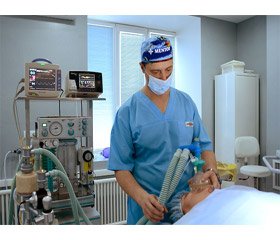Журнал «Медицина неотложных состояний» 1 (64) 2015
Вернуться к номеру
Structured Clinical Examination in Anesthesiology in Great Britain: the Experience of Implementation in Ukraine
Авторы: Pylypenko M.M. - National Medical Academy of Postgraduate Education named after P.L. Shupyk, Kyiv, Ukraine; Rybinkina I. - Brighton Hospital, East Sussex, Great Britain; Bondar M.V., Shlapak I.P. - National Medical Academy of Postgraduate Education named after P.L. Shupyk, Kyiv, Ukraine
Рубрики: Медицина неотложных состояний
Разделы: Клинические исследования
Версия для печати
Background. Throughout the many decades people been searching to find that perfect educational model with curriculum that suits all needs and exam system which is fair and representative of the knowledge students have. In medicine its not only the mark that matters – we are talking about the qualifications and practical skills that trainees gain upon graduating and becoming fully qualified medical doctors ready for independent practice. Since 2004 the postgraduate education was divided on 2 years of basic training after that the resident has to pass exam FRCA Primary and 5 years of specialization training. Attentive control and checking the knowledge by thorough examination it is the crucial point of this system.
Materials and methods. We conduct attempt for implement the simplified variant of Objective Structured Clinical Exam – OSCE exam that is the prominent part of the FRCA Primary for the Ukrainian residents who finished 2 years course of postgraduate education in anaesthesia and intensive care (internatura).
For that reason we prepared 8 clinical and theoretical stations:
1. Clinical situation – critical states in anaesthetic practice.
2. Cardio-pulmonary resuscitation.
3. Preoperative patient estimation.
4. Practical performance of clinical skills on manikin (epidural anaesthesia, placement of laryngeal masks, needle conicothomy).
5. Anaesthetic tools (laryngoscopes, Magil forceps, intubation tubes).
6. Patient primary survey (on manikin) or Glasgo Coma Scale evaluation.
7. Written description of roentgenogram or ECG.
8. Written description of neck anatomy or neural tracts.
On these clinical and theoretical stations 2 teachers examined each of the residents by the test that were preparing in advance and etalons of correct answers. Prepared in advance questions and answers as well as the absence of possibility to approach to interns different questions and accept different answers leads to minimize bias during this complex exam. Such methodology allows objectively estimate both – the theoretical knowledge as well as practical skills of examinee.
Results. Beside it was luck of experience the exam was conducted successfully. It was no complains neither from the site of interns nor from the lecturers during the exam time. Time to time interns mixed the order of stations and pass them in wrong sequence.
On the basis of this exam it has been explored the stations (and corresponding anaesthetic topics) on that residents demonstrated good results and topics they poor knowledge.
From the 29 of interns who came to pass exam 20 earned more than 50 % of the possible quantity of points (and 50 % was considered as quite satisfied results). The mean score on this exam was 49,9 % means that the majority of residents would not pass this exam from the first attempt if score to pass would be similar as in UK. It has to be underlined that in UK and other development counties before pass of such exam residents have special trainings and preparations, but our interns didn’t have.
Discussion. Using the experience and advances of British system, it is possible to improve the accuracy of the given exam by introducing practical component OSCE into the exam itself as well as introducing simulation training as educational tool for future independent specialists. Our pilot project has shown the efficiency of simulation training in order to solidify theoretical knowledge and gaining confidence in future jobs. It is our aim to introduce such innovative techniques in order to improve the quality of future anaesthetists.
Conclusions.
1. Seven years of residency in UK is complex and quite complicated but it’s efficacy has been recognized over the world. The knowledge control and checking through very diligent and thorough exams is distinctive feature and feature and has paramount importance of this system.
2. OSCE exam is very the most dynamic and allow us to estimate not only theoretical knowledge but practical skills as well.
3. We received the first experience of implementation of OSCE and regardless of the fact that it is quite complicated, time and recourses consuming during its preparing and conduction we estimated our experience as positive.
4. Preliminary results analysis of this pilot interns examination shows considerable difference of between the program of education in our sociality in Ukraine and in UK. Exam reveled to be hard to pass for our interns who finished their postgraduate specialization in anaesthesia. It encourages us to change our education process and approaches to checking and control of interns’ knowledge.

